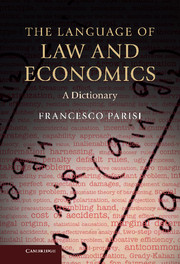Z
Published online by Cambridge University Press: 04 August 2017
Summary
Zermelo’s algorithm: see backward induction.
Zero marginal damages: rule identified in the law and economics literature as one of the conditions of optimality for contract damages. The damages that the breaching promisor is required to pay in the event of a breach of contract affects the promisee’s level of reliance. Expectation damages (i.e., damages that make the promisee indifferent between breach and actual performance) may lead to excessive reliance investments. The promisee is induced to invest in reliance, knowing that, in the event of a breach, greater reliance expenditures will be recovered through a larger damage award. To avoid the overreliance problem, the zero marginal damage rule indicates that the liquidation of contract damages should be invariant to the promisee’s level of reliance (formally, the derivative of damages with respect to reliance should be equal to zero). This will encourage promisees to internalize both the cost and the benefit of their reliance choices, limiting their investment to an efficient level of reliance. The practical problem of implementing a zero marginal damage rule in contracts is that, under this rule, the liquidation of damages might occasionally lead either to under-compensation (some reliance expenditures will remain uncompensated) or to over-compensation (damages are paid for reliance expenditures that were not actually made). The law and economics literature has suggested that perfect expectation damages (i.e., damages based on the promisee’s forgone benefit, evaluated at the “socially optimal” level of reliance) could be viewed as an implementation of the zero marginal damage rule. See also perfect expectation damages.
- Type
- Chapter
- Information
- The Language of Law and EconomicsA Dictionary, pp. 324 - 325Publisher: Cambridge University PressPrint publication year: 2013



